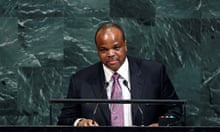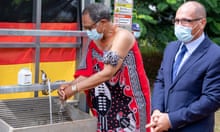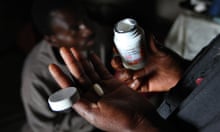The king of Swaziland, Africa’s last absolute monarchy, has announced that his country has changed its name to the Kingdom of eSwatini to mark 50 years since independence from British rule.
Meaning “place of the Swazi”, eSwatini is the Swazi language name for the tiny state landlocked between South Africa and Mozambique. Unlike some countries, Swaziland did not change its name when it gained independence in 1968 after being a British protectorate for more than 60 years.
King Mswati III declared the name change during independence day celebrations at a packed sports stadium in the second city of Manzini. “I would like to announce that Swaziland will now revert to its original name,” he said, wearing red military uniform.
“African countries on getting independence reverted to their ancient names before they were colonised. So from now on, the country will be officially be known as the Kingdom of eSwatini.”
The name Swaziland angers some citizens as it is a mix of Swazi and English.
The move had been mooted for years, with lawmakers considering the issue in 2015. The king had used the new name in previous official speeches.
Mswati, who was crowned in 1986 aged 18, rules by decree. Political parties are banned from taking part in elections and only candidates approved by chiefs loyal to the king can stand for office. The country has a population of about 1.3 million people.
The name change could mean the country’s constitution is rewritten, as well as changes for the royal Swaziland police force, the Swaziland defence force and the University of Swaziland.
After independence, Rhodesia became Zimbabwe, Nyasaland became Malawi, and Bechuanaland became Botswana.








